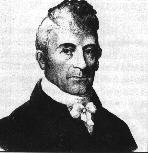


The War Department in Washington had not picked a general for the army of the center by mid-July 1812, so Daniel D. Tompkins, the governor of New York State, was required to name a commander. He chose Stephan Van Rensselaer who had recently been appointed major general of a portion of the militia being raised in the state.
At forty-eight years of age, Stephan Van Rensselaer was among the richest and most powerful men in New York. His family's vast land holdings near Albany dated back to the early 1600s when the Dutch settled on the shores of the Hudson River. Van Rensselaer was a graduate of Harvard and had been elected to the state assembly and to it's senate. For the first time he was also the state's lieutenant governor, but prior to his militia appointment had never been involved in military affairs.
Daniel Tompkin's selection of Stephan Van Rensselaer as the commander of the Army of the Center was a clever tactic. Van Rensselaer was a member of the Federalist Party and an opponent of Tompkins who belonged to the Republican Party. Van Rensselaer had been against the war with Britain, which men like Tompkin and President James Madison had wanted. It was expected that in the upcoming elections Van Rensselaer would run against Tompkin for the governorship. Van Rensselaer could hardly turn down Tompkins offer to lead the army for fear of appearing unpatriotic to the New York voters. Tompkins also knew that the army would keep his rival busy and might even prevent Van Rensselaer from campaigning. Of course, if Van Rensselaer gained quick victory he would win public fame, but that possibility was a risk Tompkins was apparenty willing to take. And, Van Rensselaer was also willing to accept the postiton, despite his lack of military experience, perhaps in hopes of serving hid country and winning a victorious vote or two.
Stephan Van Rensselaer selected two men to act as his aides de camp. One was his thirty-eight year old cousin, Solomon Van Rensselaer, who had seen action in the 1790s as a regular army officer. he joined the general as a lieutenant colonel in the New York Militia. John Lovett, a fellow Federalist and friend who lacked military experience, was given the rank of major and went with the general as his personal secretary.